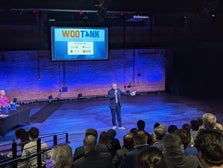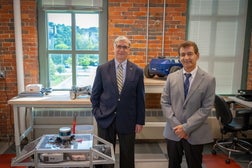Two of the grocery industry's unique brands are about to settle in Central Massachusetts
 PHOTO/WHOLE FOODS
Whole Foods Market, which is opening
in Shrewsbury Jan. 30, is known for its high-end offerings such as prepared
and organic foods.
PHOTO/WHOLE FOODS
Whole Foods Market, which is opening
in Shrewsbury Jan. 30, is known for its high-end offerings such as prepared
and organic foods.
Grocery shopping can be a mundane experience, a get-in-and-get-out exercise not exactly stirring up passion.
Then there's Whole Foods Market and Market Basket.
Two of the most talked-about supermarkets – at roughly opposite ends of the price spectrum – are poised to enter the Worcester market for the first time. Whole Foods is slated to open Jan. 30 at Shrewsbury's Lakeway Commons, while Market Basket would anchor a proposed shopping center at the former Edgemere Drive-In on Route 20, about three miles away.
Texas-based Whole Foods is known for its prepared foods and for ushering in a organic and local-food movement now common at practically every grocery store chain. With its own unique and troubled history, Market Basket, based in Tewksbury, is famous for its customer service – there are no self-checkout aisles, for example – and prices as low as anywhere.
Both Market Basket and Whole Foods enter a crowded grocery field – a notoriously low-margin business – in the Worcester area. Worcester itself has Stop & Shop, Shaw's, Price Chopper, Price Rite, Aldi and Big Y, while Wegmans is in Northborough, Market 32 is in Sutton, and Trader Joe's – another cult favorite – is in Shrewsbury just down the street from where Whole Foods will open.
Yet, the Worcester market appears ready to handle this increased load in grocers. The population of Shrewsbury swelled 3.4 percent between 2010-2016 while Worcester grew 1.9 percent. Throughout all of Central Massachusetts, the population has increased 3.9 percent.
A strict wholesome experience
Whole Foods, which already has 31 Massachusetts locations including Framingham and Sudbury, has long had a reputation extending far beyond its parking lots. To detractors who don't like the chain's traditionally high prices, the company is known derisively as Whole Paycheck. To fans, the company offers better prepared foods and organic and local options than anyone else.
“They're just really good at curating ethical and healthy foods for people,” said Julie Irwin, a business professor at the University of Texas, which is based in Whole Foods' hometown.
“They're really strict about what they carry and what they don't. A customer can walk in and know that items have already been screened, so to speak, for things like animal rights,” she said.
The business world and shoppers have wondered whether being part of Amazon would change Whole Foods, but so far it appears it hasn't changed substantially except for lower prices on some items. Amazon announced the $14-billion acquisition last August.
“There was this question of what will it be like when you go in [after the Amazon deal], but I don't think it seems any different,” Irwin said.
The 50,000-square-foot Shrewsbury Whole Foods will have two unique features: Amazon Lockers, where shoppers can pick up or return packages, and the Borgatti Bar, a second-floor restaurant with snacks, sandwiches and salads, and a bar with 12 beers on tap. The bar is named after Anthony “Spag” Borgatti, the owner of the longtime Spag's store that once stood on the Lakeway Commons site.
Market Basket's tumultuous history
Market Basket has long been in cities like Fitchburg and Lowell, and it has opened stores in Athol, Hudson and Oxford. But the Shrewsbury location, which is not finalized, would be the company's first directly in the Worcester area.
Even those who aren't regular Market Basket shoppers may still be familiar with its story, including when a fight for the company made national headlines in 2014.
Athanasios and Efrosine Demoulas, husband-and-wife immigrants from Greece, ran the first store together in Lowell for decades until two of their sons – George and Telemachus, known as Mike – took over.
It was under the brothers the market grew into much of what it is today. But it was George's early death in 1971 ultimately landing the company and the family in years of legal trouble.
The two brothers and their families had decided years before to make each the executor of the other's estate upon that brother's death.
But two decades later, George's sons, Evan and Arthur S. Demoulas, went through documents and were startled to discover the 50-50 split the two brothers and their families had in the company was now about 80-20. Their uncle had taken 80 percent of the company.
That began a long legal battle between the two Arthurs – Arthur S. and Arthur T. Demoulas, now the beloved head of Market Basket – and their families. After more than a decade, a judge found that Mike Demoulas – Arthur T.'s father and a philanthropic leader in the Lowell area – had defrauded his late brother's heirs out of hundreds of millions of dollars they would have made in the meantime. Arthur S.'s side was also given a slight majority of the company, 50.5 percent.
Thanks to a complicated turn of events – Evan's widow decided she would vote for Arthur T.'s side, tipping majority control to him – the company stayed much the same. That changed starting in 2013, when the widow, Rafaela Evans, changed her mind and began voting with her late husband's side after all.
Arthur T. was fired the following year, spurring a summer-long uprising from Market Basket's employees, customers and vendors. Each part said they wouldn't work at, shop at or ship to Market Basket until Arthur T. was back in charge.
In short order, the company was nearly taken under. More than 90 percent of sales disappeared, ultimately forcing Arthur S.'s side to sell to Arthur T. Without the customers, employees and vendors, the company appeared to be worth practically nothing except the stores and warehouses.
A message was sent to the business world: Chasing quarterly growth numbers and maximizing profit only works to a point. If Market Basket had been like any other corporation, it wouldn't have been a company that employees were willing to risk their livelihoods to save.
“This is one of those things that's almost magic,” said Francis Hoy, a business professor at Worcester Polytechnic Institute who closely followed the story. “If we could teach this in business courses, we could really see some miracles out there.”
Market Basket, which now has around 80 stores in Massachusetts, New Hampshire and Maine, manages to be as competitive on prices as Walmart, Hoy said. Walmart announced a plan this month to pay a $11 minimum wage but has never been known as a desirable place to work.
“Walmart and Market Basket culture, it's two different things,” Hoy said.













0 Comments